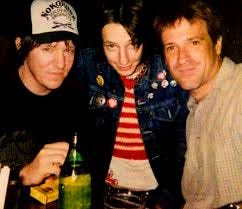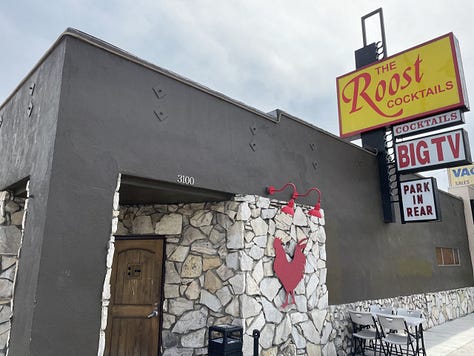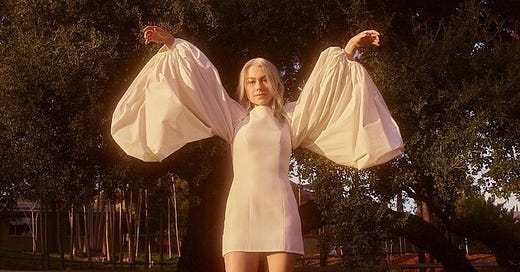Phoebe Bridgers & Elliott Smith
"Punisher," by Phoebe Bridgers, & "Twilight" by Elliott Smith
PART ONE: "Punisher” by Phoebe Bridgers
Phoebe Bridgers was an indie breakout star in 2018; since then she has released two strong albums. It’s been four years since her last solo effort, 2021’s Punisher, a gorgeous collection of slow-tempo folk songs with an airy atmosphere.
Punishers, in music industry parlance, are aggressive fans who talk your ear off. The title track from that album, one of Bridgers’ best songs, is about her obsession with Elliott Smith.
When the speed kicks in
I go to the store for nothing
And walk right by
The house where you lived with Snow White
There’s nothing more Elliott Smith than taking speed and going to the corner store; just listen to “St. Ides Heaven.” Bridgers, who lives in East LA, obliquely refers to the Snow White Cottages in Los Feliz. The eight-building development dates back to 1931, and is named for its supposed influence on the aesthetics of the 1937 Disney classic Snow White. Smith lived there in 2001, and the reference further imbues this song with a sense of obsessive fandom. Bridgers, we are to understand, knows everything about Elliott Smith.
The drugstores are open all night
The only real reason I moved to the east side
I love a good place to hide in plain sightWhat if I told you I feel like I know you
But we never met?
On “Punisher,” Bridgers sings in a light, whispery, tone that has its roots in Elliott Smith’s vocal delivery. But it’s not an impersonation, either. Where Smith often sounded—especially near the end—like he was on the verge of tears, Bridgers sings here in a disaffected, nearly dissociated tone. Paired with the song’s eerie sonics and cathedral BPM, it a conjures a lost-in-thought, late-night fugue state.
And here everyone knows you're the way to my heart
Hear so many stories of you at the bar
Most times alone, and some looking your worst
But never not sweet to the trust funds and punishersA copycat killer with a chemical cut
Either I'm careless or I wanna get caught
Serial killers who mimic the crimes of other killers are called “copycats;” here, Bridgers uses the criminal language to pathologize the inspiration she takes from Smith, layering the song in ironic self-awareness.
The first stanza here is the one I always come back to. Despite the lack of visual detail, the words evoke images. I see Elliott Smith, sitting alone at a bar in East LA (probably The Roost in Atwater Village). Looking his worst, but—and this is important—never not kind to the trust funds and punishers. This scene, vivid in my mind, is also depicted in one of Smith’s finest songs, “Twilight.”
PART TWO: “Twilight,” by Elliott Smith
“Twilight” is considered of Elliott Smith’s saddest songs, and some of that is owed to the rawness of his singing here. It’s very beautiful, with his signature stretched-out high notes and multitracked harmonies; but there’s no way around how fucking sad it sounds. The effect is pleading, sort of desperate, and three-dimensionally depressing in a way that only Smith has ever conjured.
Haven't laughed this hard in a long time
I better stop now before I start crying
Go off to sleep in the sunshine
I don't want to see the day when it's dying
The Elliott Smith of this song finds himself in a tenuous moment. To react to laughter with the fear of crying, to sleep in the daytime to avoid witnessing sunsets—think of these lines as the establishing shots of a brutally unhealthy headspace.
She's a sight to see (sight to see)
She's good to me (good to me)
But I'm already somebody's baby
She's a pretty thing (a pretty thing)
And she knows everything (everything)
But I'm already somebody's baby
With the headspace established, we can get into the story of this song, which reads eerily similar to what Bridgers’ “Punisher” describes. Elliott Smith is sitting at a bar when a fan approaches and starts to flirt with him, maybe even offers to take him home. But he politely, even mournfully, rejects her offer. She's a “sight to see,” a “pretty thing,” but he’s taken. He's being kind, even to the trust funds and punishers.
“Somebody’s baby” is another lyric that stands out to me. The more I write about Elliott Smith, the more I see infantilization as a primary theme of his work. Heroin users often describe the sense of being enveloped in a warm, womb-like embrace, and severe substance abuse can return fully-formed adults to a childlike state of being. He doesn’t say he’s someone’s lover—he says he’s their baby. This language removes agency from the narrator. He is not comfortable making his own decisions.
You don't deserve to be lonely
But those drugs you got won't make you feel better
Pretty soon, you'll find it's the only
Little part of your life you're keeping together
Smithwarns his counterpart that she shouldn’t keep using “those drugs you got,” which surely tempt him as much as anyone. The word choice here will stick with me for a long time. Smith would have known better than anyone the way that a part-time habit can become a full-time job. He's giving advice, one addict to another, but he's really speaking to an aching, self-aware sadness about what has happened in his life.
I'm nice to you (nice to you)
I could make it through (make it through)
But you're already somebody's baby
I could make you smile (make you smile)
If you stayed a while (stayed a while)
But how long will you stay with me, baby?
This is more of the same, but reversed. Sure, we could make it work. But you’re taken, too, so what’s the point? Besides, would you really stick it out with me? Implied here and elsewhere is an irrevocable brokenness on the part of Elliott Smith. In some sense, he is saying that he’s too far gone to even bother with starting a new romance. To bother with flirting, to bother with cheating.
Because your candle burns too bright
Well, I almost forgot it was twilight
The words Smith chooses as the song nears its end lend a fairytale aura to “Twilight.” They elevate the story to a powerful sort of sadsack imagism. His counterpart at the bar is symbolized as a literal candle, one that burns “too bright.” This goes back to his brokenness, to his fear of laughter, to his fear of—appropriately—twilight. It emphasizes his childish nature as well, implying a curfew that even Cinderella would’ve found restrictive.
Even if I think that you are right
Well, I'm tired of being down, I got no fight
The closing lines of the final verse in “Twilight” are so sad that I find them difficult to write about, the implications too depressing to tease out more explicitly. I will just say that this is a beautiful song, worthy of listening to over and over, worthy of deep understanding and emotional research.
Below are some pictures of The Roost, the Atwater Village bar where Smith hung out seven days a week when he was in Los Angeles. Shots of Bushmill or Jameson, apparently, and Sam Adams when he drank beer.










Great stuff!
Thank you!